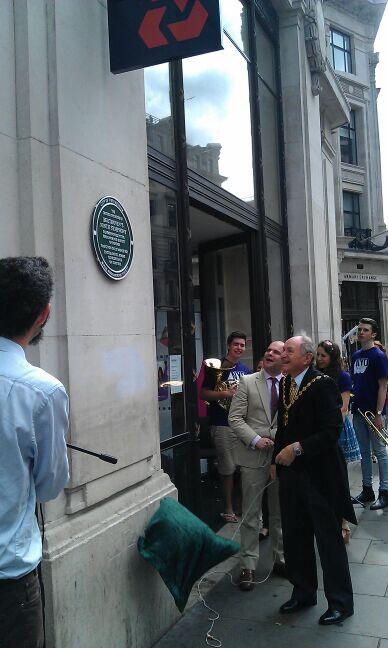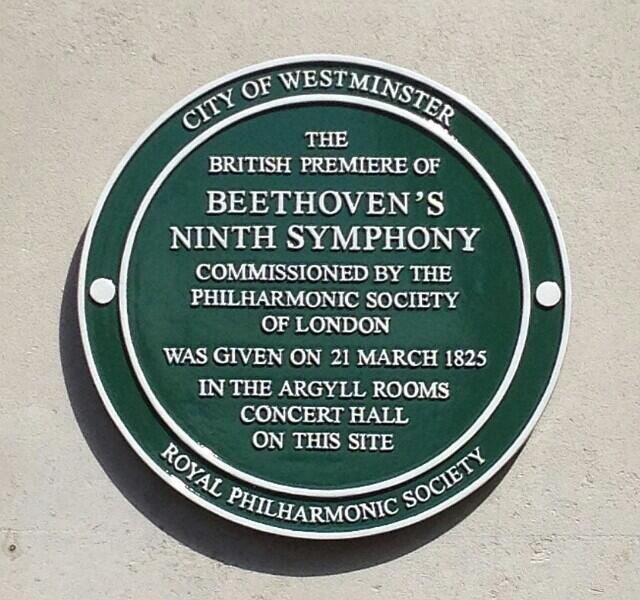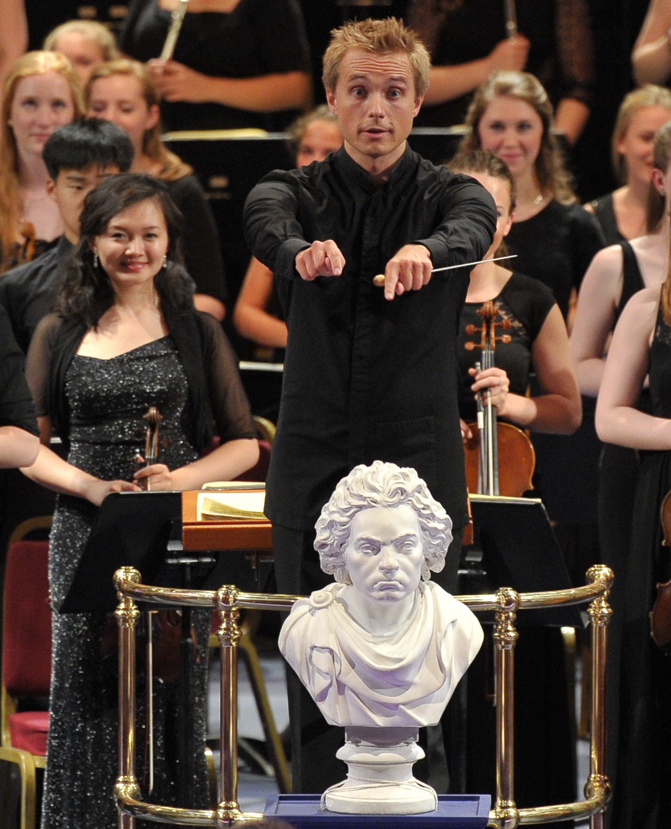The RPS Julius Isserlis Scholarship offers young musicians the unique experience of studying abroad. Many grant winners have gone on to have fantastic careers - not least the very first recipient of the award, pianist Stephen Hough, whose grant assisted his Master's studies at the Juilliard School.
Following in his footsteps is harpist Emily Hoile, who also chose to study at New York's Juilliard School with the help of a £10,000 Julius Isserlis grant in 2011. A second award from this year's Julius Isserlis Scholarship enables her to complete her studies there.
Recently, we caught up with Emily to find out how life across the Atlantic has been treating her.
HP What
attracted you to the Juilliard School in particular?
EH The main
reason I applied to Juilliard was because of the harp teacher there, Nancy
Allen, who is the principal harpist of the New York Philharmonic. One of my
favourite recordings that I owned was of her playing the Ginastera harp
concerto so from there I found out that she taught at Juilliard! Besides Nancy,
I think one of the things that really stood out to me about Juilliard was the
range of performing arts that people study there. Along with having a fantastic
music department, they have equally inspirational drama and dance divisions.
HP What
repertoire are you working on at the moment?
 EH I have just
taken part in the USA International Harp Competition so for the past few months
I have been pretty much exclusively working on the repertoire for that. It
encompassed some of the well know standard pieces of harp repertoire such
Fauré's Impromptu for harp and Reinecke's Concerto, but besides that there were
some lesser well known harp works: transcriptions of Scarlatti sonatas for
example, as well as a 40 minute recital of your own choice of music. As part of
that I have transcribed a couple of works - my favourite is 'Wiegenlied' by
Strauss, originally for soprano with piano accompaniment. I think there's just
something quite special about the way it works with the sound and resonance of
the harp. At the moment I'm thinking about what new pieces to learn this year
so am having fun just reading through a lot of music, from the standard harp
repertoire as well as some possible piano transcriptions!
EH I have just
taken part in the USA International Harp Competition so for the past few months
I have been pretty much exclusively working on the repertoire for that. It
encompassed some of the well know standard pieces of harp repertoire such
Fauré's Impromptu for harp and Reinecke's Concerto, but besides that there were
some lesser well known harp works: transcriptions of Scarlatti sonatas for
example, as well as a 40 minute recital of your own choice of music. As part of
that I have transcribed a couple of works - my favourite is 'Wiegenlied' by
Strauss, originally for soprano with piano accompaniment. I think there's just
something quite special about the way it works with the sound and resonance of
the harp. At the moment I'm thinking about what new pieces to learn this year
so am having fun just reading through a lot of music, from the standard harp
repertoire as well as some possible piano transcriptions!
HP What do you most enjoy playing?
EH I really
enjoy playing a lot of different styles of music. Since studying at Juilliard
I've discovered that I really love playing modern music, either solo or in an
ensemble. I think as a harpist it's quite easy to be in your own bubble of solo
harp music with it's distinctive style, that to be in a group, playing
extremely challenging music both harmonically and rhythmically, where everyone
has to be 100% committed is really refreshing. Later this month I'm
really excited to be going to Finland to perform with Juilliard's new music
ensemble 'Axiom' and musicians from the Sibelius Academy conducted by Susanna
Malkki.
HP What
have been the highlights of your time at Juilliard so far?
EH There have
been so many! Getting the chance to perform 'sur Incises' by Boulez in my
second year was incredible - a mammoth 40 minute work for three pianists, three
percussionists and (most importantly, obviously) three harpists. That was
probably one of my favourite, and most challenging ensemble concerts that I've
ever played. Also, earlier this year I organised a collaborative performance of
Caplet's 'Le Conte Fantastique' for harp and string quartet. It's a piece based
on the Edgar Allen Poe story 'The Masque of the Red Death' so we had a student
narrate as we went along, as well as four dancers in my year who choreographed
certain sections to heighten the drama. It was really fantastic getting to work
with students from the other divisions in the school and learning how they work
and think. It's fascinating.
HP New York
is a long way to take a harp! How have you managed the distance in terms of
transporting your instrument?
EH I have been
very lucky, in that Juilliard owns ten harps that the harp students can use at
any time. Whilst I would have loved to take my harp with me, it ended up being
easier practising on the school harps and using them for rehearsals and
performances. The main difficulty with this is that you don't get so much
chance to work with one specific instrument and really discover all of its
nuances and sounds, but it does make you more flexible and adept at playing
many different instruments, something that you have to do a lot as a harpist.
HP How have
you found living in the US, especially considering you moved there just after
finishing school?
 EH It was quite
a funny move. I think that due to the lack of a language barrier that I wasn't
expecting there to be too much of a culture shock. Turns out there are quite a
lot of differences between the UK and New York, from the ways in which people
interact to the fact that you don't get a takeaway pizza, you get a takeaway
slice. At the end of the day I didn't find it too difficult to get into the
swing of things over there, it was definitely an exciting time so all the
differences made the experience more interesting! I lived in the Juilliard
dorms for two years, so immediately when I arrived there was a welcome
'Orientation' week (the US version of freshers, minus the alcohol) where
everyone from the students to the staff were extremely friendly and welcoming.
Having lived in New York for three years now I've really settled into the way
of life - albeit a crazily busy and fast paced one - and am looking forward to
really making the most of my final year there!
EH It was quite
a funny move. I think that due to the lack of a language barrier that I wasn't
expecting there to be too much of a culture shock. Turns out there are quite a
lot of differences between the UK and New York, from the ways in which people
interact to the fact that you don't get a takeaway pizza, you get a takeaway
slice. At the end of the day I didn't find it too difficult to get into the
swing of things over there, it was definitely an exciting time so all the
differences made the experience more interesting! I lived in the Juilliard
dorms for two years, so immediately when I arrived there was a welcome
'Orientation' week (the US version of freshers, minus the alcohol) where
everyone from the students to the staff were extremely friendly and welcoming.
Having lived in New York for three years now I've really settled into the way
of life - albeit a crazily busy and fast paced one - and am looking forward to
really making the most of my final year there!
HP What do
you hope to do on graduating from Juilliard?
EH After
graduating from Juilliard I'd love to get out, work with lots of different
musicians and artists and just perform! Practically speaking, I need to decide
whether to stay in the US and work there, or whether I should move somewhere
new and discover a new artistic culture (or in fact return to the UK). So at
the moment I am thinking through different ideas and looking into different
options- it's exciting and scary in pretty much equal measures.
HP What
advice would you have for young musicians who are looking to study abroad?
EH If you want
to do it, go for it! Studying in a different country is fantastic as it really
gives you time to settle into a new place and experience it for a good length
of time. Musically it also really interesting studying somewhere
completely different, as you can get so used to the way you usually work, and
being in a new environment with its own way of thinking and working sort of
shakes that up forcing you to think in new ways. I've had an awesome time
being a student in such a vibrant city, meeting some fantastic people from all
over the world, both students and teachers, who I have learnt so much
from.
The RPS Julius Isserlis Scholarship is a biennial award which offers up to £30,000 for a young instrumentalist to study abroad for a period of two years. It is open to all classical instrumentalists of any nationality between the ages of 15 and 25 who are permanently resident in the UK. The next closing date is 13 March 2015. Please visit our website for further information.

















